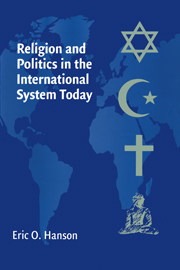Book contents
- Frontmatter
- Contents
- Acknowledgments
- Religion and Politics in the International System Today
- Introdution: The view from Silicon Valley
- I RELIGION AND POLITICS IN THE NEW GLOBAL PARADIGM
- 1 A New Paradigm for World Politics?
- 2 A Political Perspective on Religion and Politics
- 3 A Religious Perspective on Religion and Politics
- 4 The Religions of the Book, Meditative Experience, and Public Life
- II RELIGION IN CONTEMPORARY WORLD POLITICS
- Appendix I Thirty Years of Nobel Peace Prizes, 1975–2004
- Appendix II Paradigm Chart and Category Questions
- Index
2 - A Political Perspective on Religion and Politics
Published online by Cambridge University Press: 06 January 2010
- Frontmatter
- Contents
- Acknowledgments
- Religion and Politics in the International System Today
- Introdution: The view from Silicon Valley
- I RELIGION AND POLITICS IN THE NEW GLOBAL PARADIGM
- 1 A New Paradigm for World Politics?
- 2 A Political Perspective on Religion and Politics
- 3 A Religious Perspective on Religion and Politics
- 4 The Religions of the Book, Meditative Experience, and Public Life
- II RELIGION IN CONTEMPORARY WORLD POLITICS
- Appendix I Thirty Years of Nobel Peace Prizes, 1975–2004
- Appendix II Paradigm Chart and Category Questions
- Index
Summary
A fundamental understanding of the relationships between politics and religion demands analysis from both political and religious viewpoints. Chapter 2 presents the political perspective and Chapter 3 the religious one. Each viewpoint provides one of the principal three factors (level of interaction, nature of religion, regional or national cultural form) in describing these political-religious interactions for the second geographical plane of the paradigm. This second chapter examines the political impact of religion at the local, national, regional, and global levels. In doing so, it provides examples that have been chosen for their later usefulness in contemporary political-religious analysis. It is no accident that the political influence of Christian, Hindu, Jewish, and Muslim “fundamentalisms” receives treatment.
RELIGION IN LOCAL POLITICS: DIFFUSED RELIGION
Traditional religion has played a major role in local politics by constituting a civilization's basic unit, thus setting the parameters and rules for political competition for material and psychic resources and determining legitimacy in the use of force for common ends. Such diffused religion remains dominant at the local level in much of the developing world. “The religion of the village is the life of the village,” making it very difficult to separate what professional academics call the political and religious aspects of life, either in rural village or urbanized neighborhood settings. The principal local political-religious issues are: (1) the individual's ability to maintain or to create a satisfactory personal identity within a static or changing worldview; and (2) the distribution of political and economic power within the fused local political-religious system.
- Type
- Chapter
- Information
- Religion and Politics in the International System Today , pp. 47 - 69Publisher: Cambridge University PressPrint publication year: 2006



